Struggling to drive more leads and sales with your email marketing?
One effective strategy to increase revenue and sales is through strategic product recommendation emails.
By showcasing personalized product recommendations at the right time and using proven elements and strategies, you can engage your subscribers and convince them to make a purchase.
In this article, we’ll cover what a product recommendation email actually is and discuss the benefits of sending them. We’ll also share some great examples and best practices that can help you increase sales and drive revenue for your business.
- What Is a Product Recommendation Email?
- Advantages of Sending Product Recommendation Emails
- 8 Product Recommendation Email Examples to Drive More Leads
- Best Product Recommendation Emails Practices
- Increase Sales With Effective Product Recommendation Emails!
What Is a Product Recommendation Email?
Have you ever received an email from your favorite eCommerce store showcasing products that perfectly match your taste and preferences?
That’s what we call a product recommendation email, a brilliant promotional strategy that’s gaining popularity in email marketing campaigns.
A product recommendation email is a type of promotional email used in email marketing campaigns. Its purpose is to showcase the right products and services and encourage customers to buy them, leading to increased sales and revenue.
You can send these product recommendation emails to your potential customers and suggest products you think they might like. This way, they’ll be more likely to remember your business and stay interested in what you offer.
Advantages of Sending Product Recommendation Emails
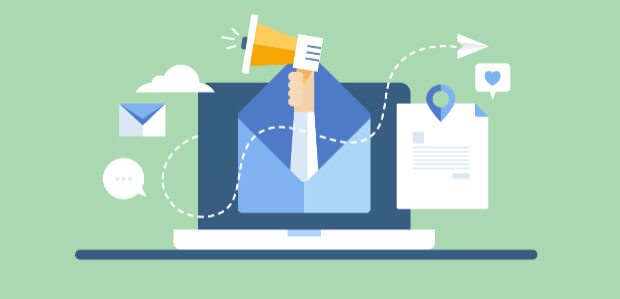
Sending product recommendation emails to your prospects can work wonders for your business.
In fact, product recommendations in your emails can increase the click-through rate by a whopping 840% or more.
This means more people visiting your website and, ultimately, more sales!
Let’s look at a few more advantages of sending product recommendation emails as part of your email marketing campaign:
Building Brand Awareness
Have you ever discovered a new brand or product you had never heard of before, but it instantly caught your attention? That’s the power of effective marketing, and product recommendation emails can be a highly effective tool in increasing brand recognition and building customer awareness.
By showcasing a variety of products or services in your emails, you’re not just promoting individual items. Instead, you’re generating interest and excitement for your brand as a whole.
Inspiring Customers
Everyone loves to discover new things, and product recommendation emails are an excellent way to offer that sense of excitement and inspiration to your customers.
By showcasing a variety of products that they may not have considered before, you’re giving them ideas and opening up new possibilities.
This is not just a sales tactic. It’s a valuable service that can help build trust in your brand. When customers see that you’re genuinely interested in helping them discover new products that fit their needs, they’re more likely to come back to you again and again.
Read our article on How to Grow Your Email List: 23 Proven and Simple Ways.
Cross-Selling and Upselling
Product recommendation emails can also be used to cross-sell and upsell products.
By highlighting complementary products or services, you’re encouraging your customers to purchase more. This can increase the average order value and drive revenue for your business.
You may find these articles helpful if you want to learn more about upselling and cross-selling:
- What Is the Difference Between Upselling and Cross-Selling?
- Best Upsell Apps for Shopify to Maximize Revenue
- How To Upsell: Upselling Tips & Examples To Boost Revenue
- How to Cross-Promote Products on Shopify
Cost-Effective Marketing
Email marketing is a cost-effective way to reach your audience, and product recommendation emails are no exception.
Not only are they easy to create and can be automated to save you time and resources, but they also have the added bonus of being highly personalized to your audience. This means that you can tailor your recommendations to their specific needs and interests, making them more likely to engage with your brand and make a purchase.
And the best part?
The return on investment (ROI) for product recommendation emails can be significant, meaning you’ll see a healthy boost in your revenue with just a little bit of effort.
According to the stats, product recommendations make up 31% of a store’s revenue. This means that nearly one-third of a store’s revenue comes from customers being recommended products to purchase.
8 Product Recommendation Email Examples to Drive More Leads
Now, how can you motivate people to click on your website link and make a purchase?
Here are 8 practical examples of using product recommendations in your email marketing campaigns from successful brands:
1. Welcome Emails
A welcome email is an excellent opportunity to make a great first impression with new customers. In fact, welcome emails have an average open rate of 50%, which is much higher than the average open rate for marketing emails.
By recommending your best products and highlighting your brand’s unique selling points, you can create a warm and engaging introduction to your business.
Here’s an example of a successful welcome email from Litmus:
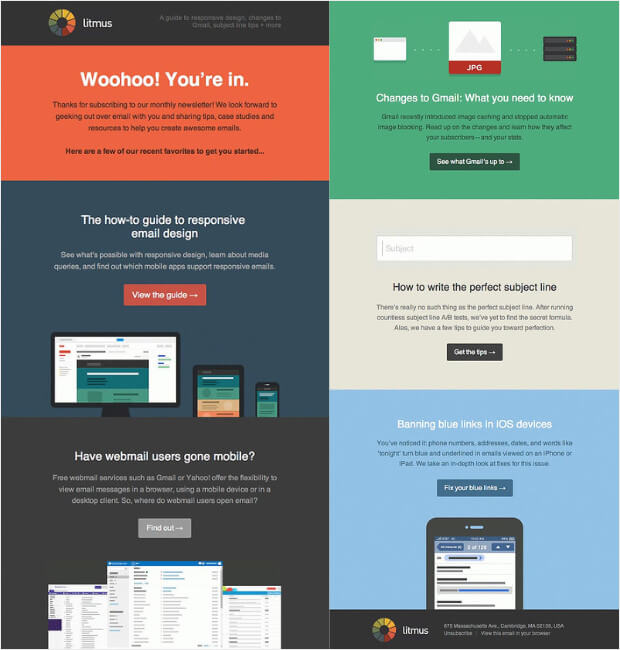
This email effectively welcomes the new subscriber to the newsletter and introduces the brand and its offerings. It is a simple, clean, brief but informative, and visually appealing email that is easy to read and navigate.
Most importantly, this email includes a clear call to action, inviting subscribers to follow the brand on social media and check out its latest blog post. The social media buttons are also prominently placed and easy to click on.
2. Seasonal and Holiday Emails
Seasonal and holiday emails are a great way to promote specific products and deals that are relevant to the occasion. Make sure to take advantage of these festive opportunities to attract more customers and spread cheer.
For instance, if it’s winter, you can showcase your warm and cozy clothing items that are perfect for the chilly season.
One great example is from AWeber:
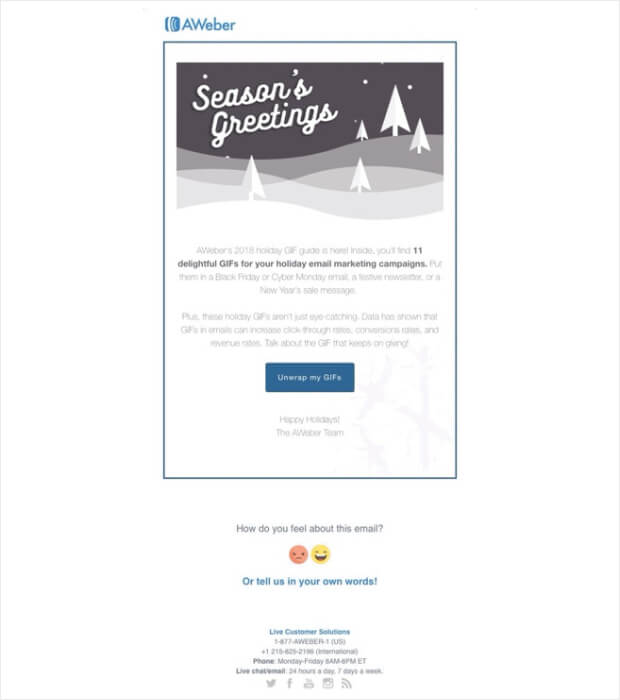
This email is good because it provides a simple and creative solution for businesses that want to make their holiday emails more engaging and fun.
It’s also visually appealing, with a clear and straightforward layout and the use of colorful graphics that match the holiday theme.
Lastly, the email has a clear call to action, encouraging readers to download the GIFs and use them in their emails.
Don’t forget to check out these 13 Excellent Holiday Email Marketing Tips to Use This Year!
3. Win-Back Emails
Have some of your customers gone silent on you?
Don’t worry. Win-back emails can help revive the relationship.
These emails remind your customers of their previous purchases and suggest similar products they might love. It’s a simple way to reignite interest and boost sales.
Here’s a sincere “we miss you” example from bareMinerals:
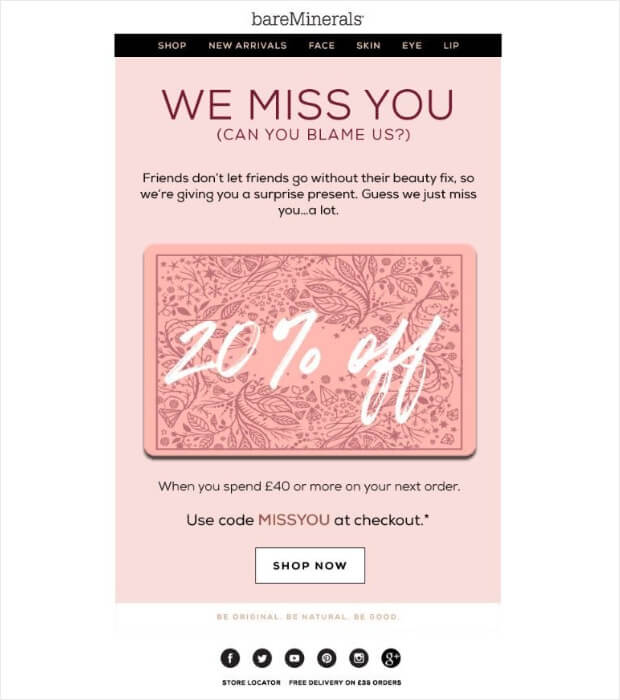
4. Personalized Newsletters
Personalized newsletters allow you to recommend products based on your customer’s purchase history, browsing behavior, and interests.
You can create different segments based on their preferences and send them personalized recommendations.
Let’s look at an amazing newsletter example from Creative Bloom:

In this email, the brand knows that its target audiences are artists and creators, so sending an all-text or bland newsletter wouldn’t appeal to them.
That’s exactly why they highlighted designers and illustrators making cool stuff in their newsletter. Talk about style.
Read our article on How to Make Money With Email Newsletters: 13 Expert (& Profitable) Tips.
5. Abandoned Cart Emails
Abandoned cart emails are sent to customers who have added items to their cart but never checked out. These emails act as a friendly reminder to customers who may have been diverted and didn’t complete the purchase.
Along with highlighting the benefits of the products in their cart, you can also recommend related products or similar products to encourage them to buy.
One great example is from Drop:
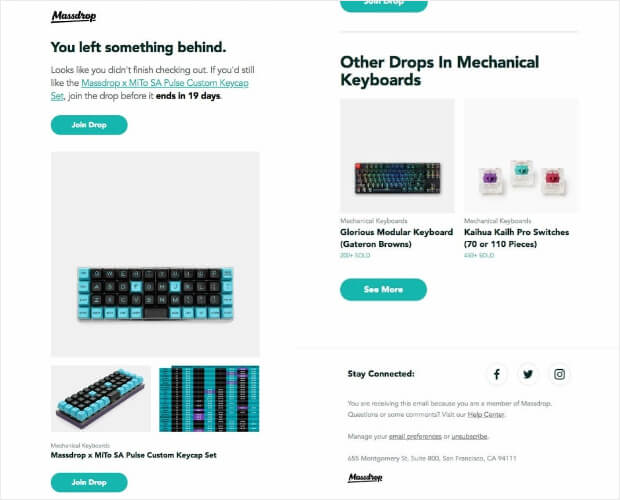
This email creates a sense of urgency with the “ends in 19 days” in the bolded text. And right after that, they also include their CTA as well as additional items that the customer might be interested in based on what’s in their cart.
This is an excellent strategy to get the customer back on their site, browse other items they might like, and finally turn into a purchase.
Here are the 14 Abandoned Cart Email Examples Proven to Boost Revenue.
6. Post-Purchase Follow-up Emails
After a customer has successfully made a purchase, you can recommend complementary or related products to them. For instance, if they bought a camera, you can recommend lenses or camera accessories.
Here’s an example from TenThousand:
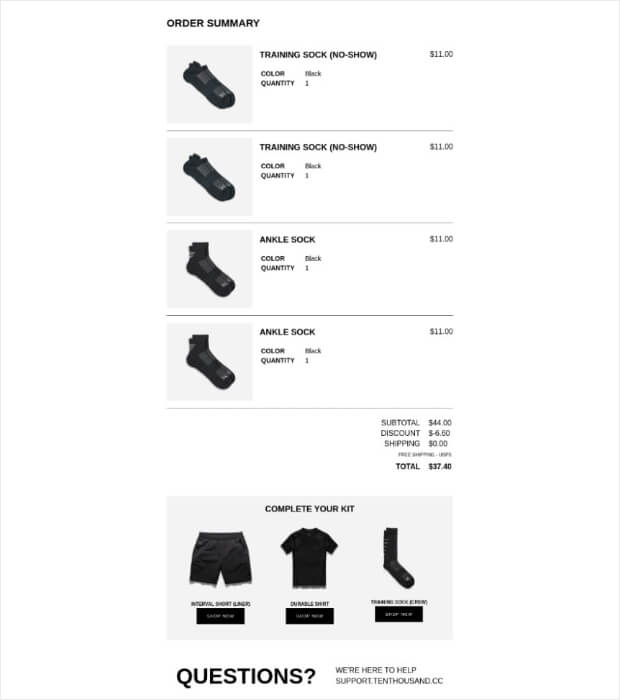
Another option is to suggest related products that were also purchased by other customers.
This works due to the concept of social proof, where customers tend to trust the recommendations of other customers. When a customer sees that others have purchased certain products, they’re more likely to consider buying them as well.
If you want to learn more, check out these 7 Killer Sales Follow-up Emails to Boost Customer Loyalty.
7. Loyalty Program Emails
These emails are a great way to engage with your customers and offer them exclusive deals based on their points, rewards, or program status.
By offering personalized product recommendations and exclusive deals, you can incentivize your customers to redeem their rewards and continue participating in your loyalty program.
This not only helps to build customer loyalty but also helps to increase customer retention and encourage repeat business.
Look at this example from Caraa:
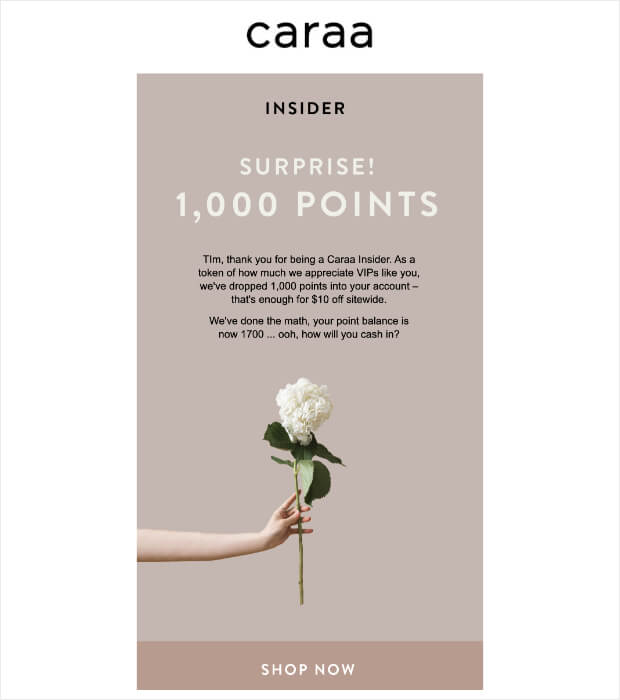
This email stands out because it clearly conveys the message (how much the reward it is offering is worth).
Not only is it beautifully branded, but it also increases the incentive to redeem points, which is a crucial indicator of loyalty program success.
8. Product Launch Emails
When you launch a new product, you can send an email to your customers, showcasing the product and its benefits.
It can help establish your brand more firmly in your audience’s minds and create interest that otherwise might seem too salesy.
Here’s one perfect example of a product launch email from Minna:
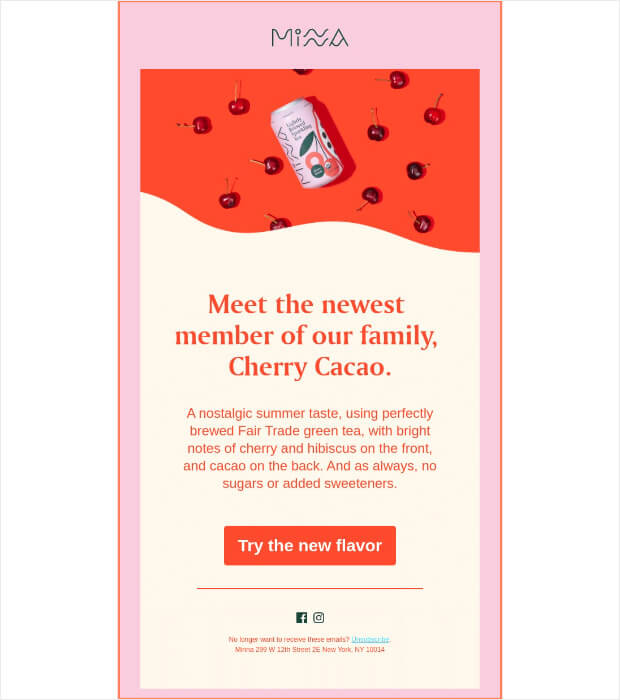
In this email, the brand used a friendly and inclusive tone of voice.
They made the communication invited and used a simple yet effective description of the product followed by a suitable CTA.
You can also read our ultimate guide on How to Crush Your Next Product Launch.
Best Product Recommendation Emails Practices
When it comes to recommending products to your customers, it’s not a one-size-fits-all approach. You need to analyze their behavior and test different marketing strategies.
By doing so, you can provide your customers with relevant recommendations that increase your chances of converting leads into sales.
Here are some tips for ensuring effective product recommendations:
1. Analyze Buyer Behavior
Understanding your customers is key to providing them with relevant product recommendations. Look at their purchasing patterns, preferences, and buying criteria.
For example, some customers may be interested in eco-friendly products, while others may prefer a particular color or style.
By analyzing their behavior, you can tailor your product recommendations to suit their needs.
Read our step-by-step guide on How To Create a Buyer Persona for Your Business.
2. Use A/B Testing
A/B testing is an effective way to determine which products perform better than others. This helps you identify which recommendations are more likely to convert leads into sales.
By testing your marketing campaigns and strategies, you can fine-tune your approach and improve your results.
Check out these amazing 60 A/B Testing Examples to Get More Conversions.
3. Maintain a Balance
Sending too many or irrelevant recommendations can be off-putting to customers. So it’s essential to strike a balance and only send relevant suggestions that are tailored to each customer. It will help you avoid spam emails and keep your customers engaged.
4. Leverage Social Proof
Social proof can be a powerful tool when it comes to recommending products. Testimonials, reviews, and ratings from your customers can help build credibility and trust in your brand. In fact, automating social proof using tools like TrustPulse can increase trust and, therefore, conversions by 15%.
With this tool, you can show real-time customer activity notifications on your website through eye-catching popups. You can apply the same principle by including social proof in your product recommendation emails and improve conversion rates.

Read Social Proof Statistics: Powerful Facts That Will Help You Boost Your Brand.
5. Automate Your Recommendations
Automated recommendations can help you create a strategy that suggests products based on available data and context. This can save you time and ensure your recommendations are always relevant and up-to-date.
Don’t forget to check these Best Email Automation Tools to Transform Your Business.
6. Time Your Emails Strategically
Yes, you need to target your customers with products that they won’t be able to resist. But it’s also equally important to recommend these products at the best time following their last interaction with your brand. By doing so, you can increase the chances of them making a purchase.
According to the stats, Tuesdays and Thursdays are the best days to send business emails. As for the exact hours of the day, times like 8 am, 1 pm, 4 pm, and 6 pm tend to work best. These are the times when people are more likely to be active online.
However, while there are recommended days and times to send business emails, there’s no one-size-fits-all rule. Every email list is unique, so it’s essential to know your audience and their preferences to determine the best send times.
Increase Sales With Effective Product Recommendation Emails!
Product recommendation emails are an effective way to drive sales and increase customer engagement. By providing your customers with relevant and personalized recommendations, you can boost your chances of converting leads into sales.
From using social proof to testing your strategies and timing your emails, there are many ways to optimize your product recommendation emails. Take inspiration from the examples we’ve covered in this article and apply these tips to your own email campaigns and grow your business.
OptinMonster is a powerful tool that can help you implement these product recommendation strategies and more.
With OptinMonster, you can easily create personalized and targeted campaigns that are tailored to your customer’s behavior and preferences.
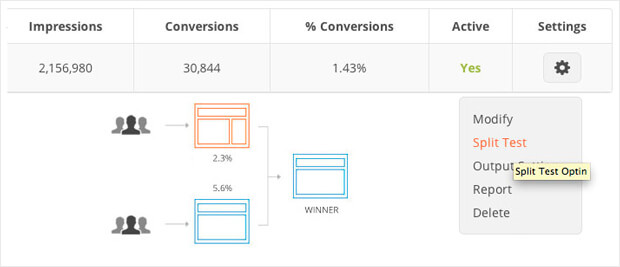
Our powerful A/B testing and segmentation features allow you to fine-tune your approach and improve your results over time.
Plus, our seamless integrations with popular email marketing platforms mean you can easily automate your product recommendations and send them at the optimal time to maximize conversions.
Sign up for OptinMonster today and start driving sales with your own powerful product recommendation email campaigns!

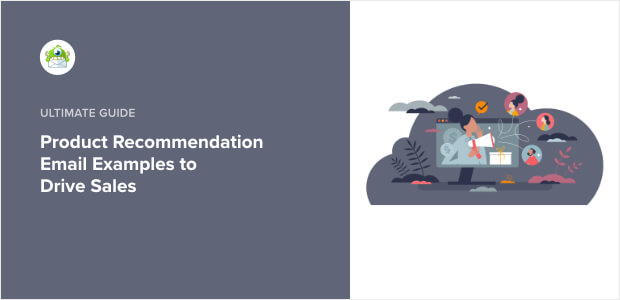


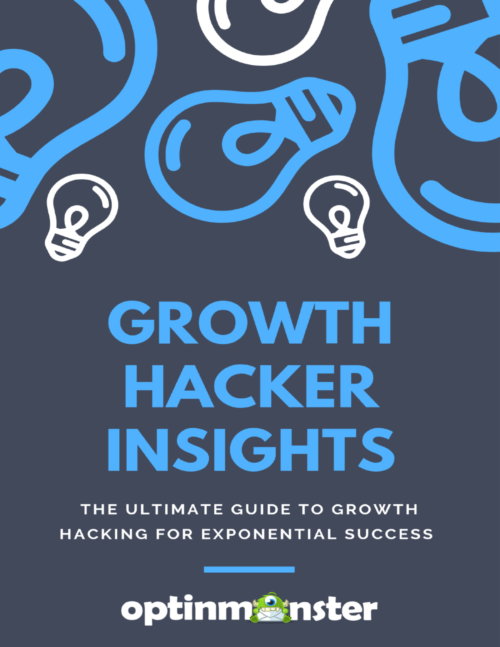
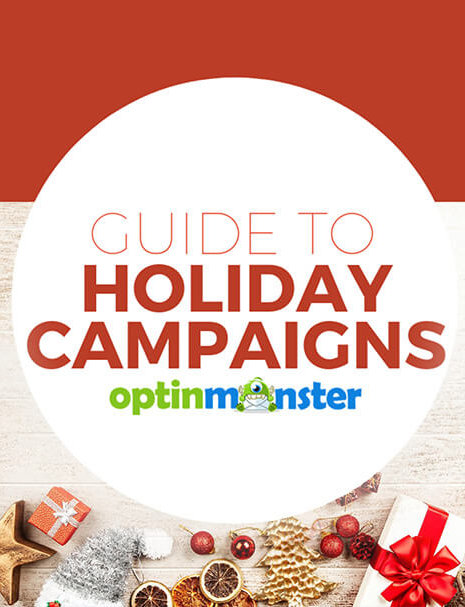
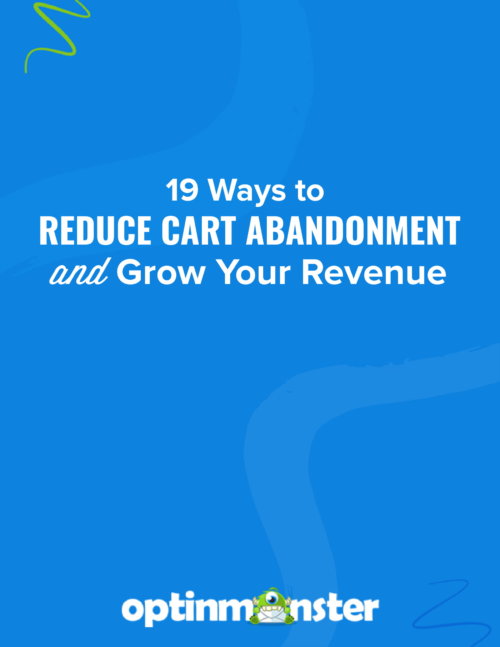



Add a Comment